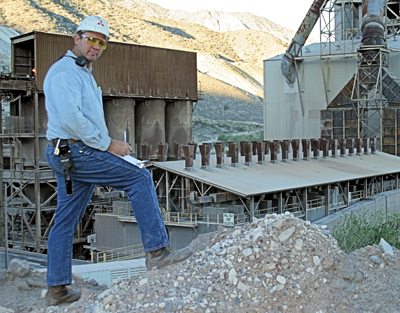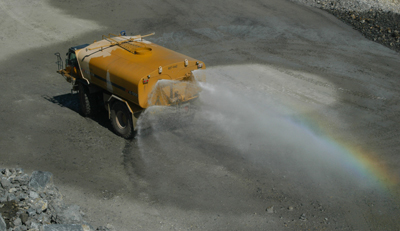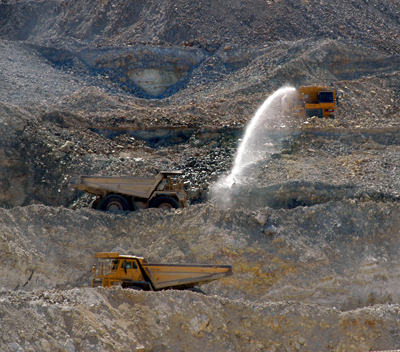Mitsubishi Cement Corporation maintains the industry’s highest standards in environmental programs. Air quality, water, waste and energy management programs must meet the stringent California Environmental standards.
Award Winning Environmental Programs
Global Cement Corporation Award for Environmental Impact Abatement 2006
Portland Cement Association
National Land Stewardship Award 2001
National Energy Efficiency Award 2003
Mojave Desert Air Quality Management District
Exemplar Awards 1997, 2000 and 2004 & 2007
California Integrated Waste Management Board
Waste Reduction Awards Program (WRAP) 2000 and 2002
San Bernardino County
Certificate of Recognition for Waste Reduction 2001
Emission Controls
The huge rotating kiln contains the 2700°F process where the raw materials are transformed into cement. The primary fuel to heat that process is low-sulfur coal. The high efficiency of combustion in the kiln yields very low hydrocarbon emissions and the 36-stack baghouse removes nearly all particulates. MCC utilizes waste tires as an alternate fuel, which reduces coal usage and lowers emissions of NOx, the major component of smog. MCC also utilizes biosolids injection, which further reduces NOx, while completely disposing of that waste. MCC is continuing to evaluate alternate, renewable fuels such as wood chips and dry-biosolids.
There are over 150 baghouse dust collectors throughout the process to minimize emission of particulates. These are constantly monitored for proper performance, with some having daily documented
observations.
There is frequent application of water to plant roads and storage piles. Paved roads throughout the plant are swept daily.
MCC is a founding member of the Cement Industry Environmental Consortium (CIEC). CIEC membership includes other local cement manufacturers and the Mojave Desert Air Quality Management District. The CIEC pioneered the use of wet biosolids in kilns for NOx reduction, and continues to evaluate emission reductions and alternate fuels.
Habitat Preservation
Just north of the cement manufacturing facility, the Cushenbury Creek surfaces year-round at Cushenbury Springs. In the 1950’s, the Springs were home to a turkey farm, but all structures are gone now. Today the springs are home to hundreds of plant and animal species. An annual bird count by the local Audubon Society verifies more than 40 different bird species. Mitsubishi Cement Corporation is preserving Cushenbury Springs as a prime habitat area.




